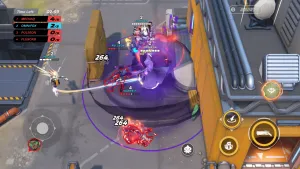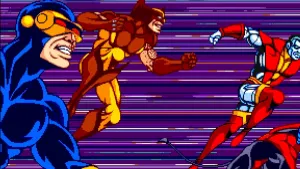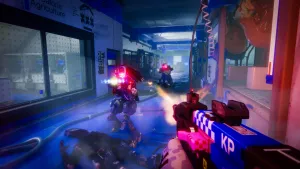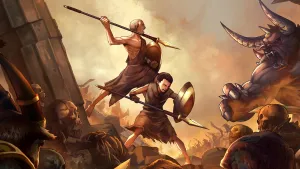Five Things CoD's Captain Price Is Doing During Black Ops

Since he's not in Black Ops, what was Call of Duty standby Captain Price doing during the Cold War? This hard-hitting piece of investigative journalism digs into an unexplored era of one of freedom's greatest heroes.
When not being honored as part of our 30 Characters Who Defined A Decade list, Call of Duty's Captain Price can typically be found saving the free world from tin pot dictators throughout the decades. As an Infinity Ward character, though, he has no place in Treyarch's soon-to-launch Call of Duty: Black Ops. What was the British super-soldier doing during the hottest part of the Cold War, since he wasn't involved with the [redacted] events of [redacted] when [redacted] [redacted] in the [redacted]?
Surprisingly, Price spent the decades not as an elite commando taking on top-secret missions to limit worldwide Soviet influence and foil nefarious Bolshevik plots – that was left to [redacted] as he [redacted] to stop [redacted] from [redacted] the United States. No, 1959-73 was a gentler era in Captain Price's distinguished career, as he worked day and night using the tools of peace to prevent war rather than the other way around.
1959: The Great Leap Forward [China]

(above: Captain Price inspires the Chinese peasants to do their part)
Price was an idealist in his younger years. In the late '50s, he seemed to think that an industrialized China would serve as a counterbalance to the militarily dominant Soviet state that was already the prime threat to the United States in the post-WWII world. By convincing chairman Mao Zedong to drag his country into the industrial age – and lending his good looks and fierce moustache to the necessary propaganda effort – Price helped to drive China's post-revolution Great Leap Forward. Though the country is still struggling with the fallout of this radical industrialization program today, China's transition from a decentralized agrarian society into a modern industrial state will likely go down in history as the most important event of the twentieth century.
After being exposed to the massive, unprecedented misery visited upon the Chinese people by the often-misguided policies of the Great Leap Forward, Price invented the helicopter and used his prototype to fly under the radar and escape to Japan. There, he latched onto the U.S. military presence and made his way back Stateside.
1962: Cuban Missile Crisis [Washington, D.C.]

(above: Captain Price playing a crucial role forming U.S. diplomatic strategy)
The discovery of secret Soviet missile bases being built in Fidel Castro's Cuba in October of 1962 brought our world the closest it has ever been to nuclear annihilation. U.S. President John F. Kennedy cemented his legacy by diplomatically resolving the situation with Russian Premier Nikita Khrushchev, but he was not without help. This recently uncovered photo from the Congressional archives shows Captain Price working hand-in-glove with Kennedy's cabinet during the crisis.
Anecdotal reports paint Price as one of the more extreme voices in the room, advocating the detonation of a high-altitude nuke over Washington, D.C. to give the U.S. an unquestionable justification to launch a preemptive strike to end the threat. Anonymous sources tell us Price's role in keeping all options on the table was critical in convincing Kennedy to resolve the conflict through diplomatic channels, and for this he is a true hero. Sadly, his unpopular views saw him driven out of D.C., and he spent the next few years among the American people in a variety of venues.
1965: Vietnam Protests [U.S.A.]

(above: Captain Price working diligently to change the political calculus on the homefront)
President Lyndon B. Johnson's early-'60s escalation of U.S. ground forces to aid the faltering anti-communist South Vietnamese regime in its struggle against Ho Chi Minh's Soviet-backed insurgency in the north marked a turning point in global politics. In the following years, public opinion back home turned on Johnson's foreign policy and waves of demonstrations rocked the country.
Captain Price, seen here displaying solidarity with the protesters (surprisingly, without a standard-issue gas mask to filter out the undoubtedly overwhelming musk of patchouli oil and flesh), switched up his tactics from his days in Kennedy's war room. Disillusioned with the officers in charge of the U.S. armed forces, he spent the summer of 1965 organizing the (thoroughly) unwashed masses to create a groundswell of public outrage over the escalating conflict in Vietnam. While this stratagem ultimately succeeded with the withdrawal of U.S. forces in the mid-'70s, Price grew impatient long before then. Many historians credit his 1967 whitewater rapids pursuit and subsequent bare-knuckled clobbering of an unnamed Army general as the fulcrum around which U.S. policy in Southeast Asia turned. Following this righteous assault, Price spent a few years back home in Europe while Pentagon tempers cooled.
1968: Prague Spring [Czechoslovakia]

(above: Price looking on in satisfaction as Soviet tanks rolled into Prague)
The long-standing Warsaw Pact, which cemented Soviet ascendancy over eastern Europe's communist states, faced its toughest test in 1968 thanks to the political machinations of one Captain Price. Newly empowered Czech First Secretary Alexander Dubček, intrigued by Price's ideas about the relationship between worker efficiency among the proletariat and materially rewarding feedback loops, launched a series of liberalizing political and economic reforms aiming to revitalize a Czech state that was stagnating under the suffocating grasp of Stalinist communism.
Known as the Prague Spring, this Price-driven realignment of Czech policy soon brought the wrath of the U.S.S.R. down on the small country. Two hundred thousand Warsaw pact troops took control of the nation, deposed Dubček, and undid all of his reforms. However, just as Captain Price predicted after careful study of Sino-Soviet relations, this draconian reaction had dire consequences for Soviet global standing as even communist China denounced the U.S.S.R. as "imperialists" following the action.
Unfortunately, Price's identity was discovered as his contacts among the Czech communist party gave him up under KGB interrogation. Price was arrested and sent to a secret Siberian gulag, which he swore to destroy one day. Following his escape a week later, he crossed the Pacific once more on his never-ending quest to aid the West.
1973: Energy crisis [U.S.A.]

(above: Price advocating improvements to residential energy efficiency before a Senate committee)
When the Arab oil-producing nations of the Middle East declared an embargo on crude oil exports in retaliation for the United States' support of Israel in recent Israeli-Arab wars, the U.S. economy was devastated. The problems created by massive dependancy on foreign oil became critical almost overnight. While the hawks in the Nixon administration advocated militarily extreme measures, Captain Price spent his days pushing a new paradigm of U.S. energy consumption that would purge this weakness from the country for good.
Though he was ultimately unsuccessful in convincing suburban WASPs to move into energy-efficient geodesic domes, and failed to revamp nationwide urban planning around a sustainable hub-and-spoke mass transit growth pattern, Price's efforts did result in an overall reduction of U.S. energy consumption that continues to this day. The changes in U.S. habits Price was largely responsible for prevented the economy from collapse despite antagonism from overseas and intransigence from the oil-producing countries who kicked off the entire crisis.
1974-2005: ???

Information on Price's doings post-Nixon is impossible to find. Though his story picks up once again with the events of Call of Duty 4: Modern Warfare, this single photo was recently sent in to Game Informer as a possible clue to the three missing decades.









